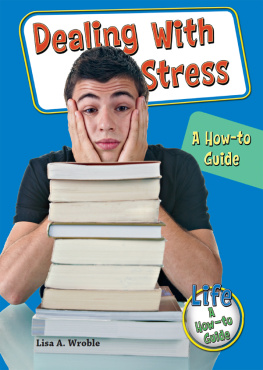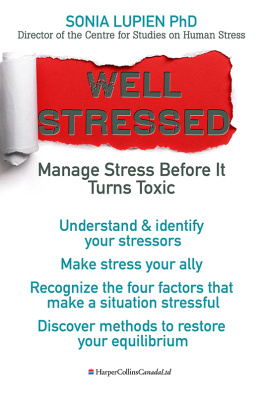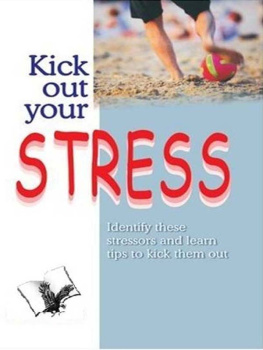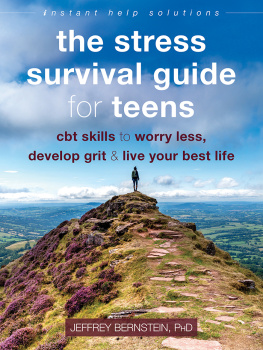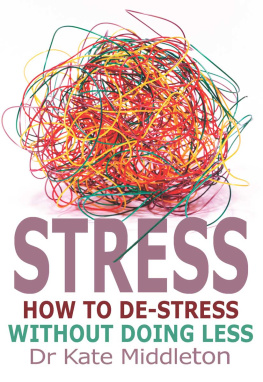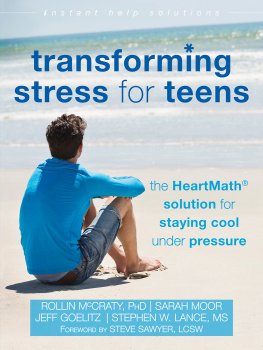
Stressed Out?
Feeling nervous, anxious, and overwhelmed? Relax! Life as a teenager can be stressful. But don't give upget informed. Learn to deal with stress by reading up on how to manage your time, avoid taking on more responsibility than you can handle, ask for help when you need it, and relaxation exercises to help you keep a cool head. Read up on the tools and techniques that will help you chill out with this informative how-to guide.
About the Author
Lisa A. Wroble is the author of more than twenty-five books and hundreds of articles on topics ranging from history and psychology to science and the environment. Among her other books for Enslow Publishers, Inc., is Food for a Greener Planet: What You Can Do.

Image Credit: Shutterstock.com
The school year had almost ended for Tyler. He was a freshman in high school and ready for a break. He and his friends were making plans and, of course, that led to drama with their girlfriends, he explains. Then he learned that his family would be moving to Florida. High school is hard enough, but having to make all new friends, adjust to a new house, a new town, and a new school was too much! But that wasnt all. The teachers started assigning more work. Every class had extra work, projects, papers, and quizzes.

Image Credit: Shutterstock.com
A fight with a parent can be a major source of stress for a teen.
When we complained, they said it was preparing us for next year and that in the future wed have to deal with college and job expectations, said Tyler, who also had taken a part-time job to save money for his summer plans. I didnt know what to focus on first so I ended up just sleeping a lot, which led to more stress because the schoolwork was not getting done. What a way to end the school year and say good-bye! he said.
As young adults we face situations that are real and painful. We do not yet have the tools that we need to deal with them because it is our first time in life when we face daily challenges. I think parents and teachers already know this but they just forgot what it was like not having any answers and perhaps they could be more sensitive about all of it when dealing with their child or student.
Sara, age 19, Naples, Florida
Stressthis word might make stomachs tighten or muscles tense. Those are reactions to stress. Stress is how our bodies respond to anything seen as a threat. Triggers, or causes of stress, are all around us. They are called stressors. People, places, events, and situations can all cause stress.
Stress affects every part of life. At home, hassles with parents cause stress. Fights with brothers and sisters might cause extra tension. A study of Baltimore, Maryland, teens found family conflicts usually involved doing their homework, cleaning their room, and doing chores. At school, tests, homework, and teachers cause anxiety. Coaches, tutors, and bosses add to pressures teens face. Sometimes it is a mix of these things.
Seventeen-year-old Margot, a high-school senior, says she gets emotional when she is stressed with too much to do. I feel angry when I have lots of schoolwork to do but have to pick my brothers up from a game.
Often stress happens when we already feel overloaded. We do not feel in control of everything we have to do. This is why we think of stress as bad. But good things can cause stress too. A new job, getting a scholarship, or winning a tournament adds pressure to succeed. Getting accepted to college means adjusting to change. Even getting married can cause stress.

Image Credit: Shutterstock.com
One of several stress-causing issues teens face is keeping the peace with their siblings.
Stress is the bodys reaction to danger. When you step off the curb and see a car speeding straight for you, you feel fear. Fear triggers adrenaline, so your heart races, and your brain sends signals to jump out of the way. The car passes. You are back on the curb, safe. But your heart will still beat fast until the brain and body are sure the danger has passed.
This is a physical response. But emotions are mixed in as well. When fifteen-year-old Megan feels stressed she says, I get a really big attitude or I get really sad. I often cry or yell.
According to research conducted by psychologists in Minnesota and Maryland, teens deal with problems at home, at school, at work, and with friends. Top stressors include:
- Homework
- Tests
- Conflicts with teachers
- Arguments with parents
- Getting along with siblings
- Chores
- Divorce
- Illness of family member
- Juggling a job and schoolwork
- Juggling sports or afterschool activities
- Helping friends with problems
- Pressure from friends to try drugs, alcohol, or sex
- Planning for future (job, career, college)
The many challenges of the teen years add to stress. Adoles-cence is the extraordinary period of dynamic change when a person moves from childhood to adulthood, according to a 2007 report from the Office of the U.S. Surgeon General. During this transition, adolescents must cope with dramatic changes in their bodies, feelings, perspectives, and environments. The report discusses the stresses teens face due to being teens. They are caught between friends and family even as they move toward self-reliance, the report explains. They will experience unfamiliar situations, pressures, desires, and challenges for which they have no prior frame of reference and often are not fully prepared to deal with effectively on their own.
Doctors and psychologists have studied stress in children and teens. All children must deal with the challenges of growing, explains human development specialist Dr. Aaron T. Ebata. Going through puberty is hard. Hormones are causing tangible changes, such as growth of body hair, acne, vocal changes, and developing bodies. What you see on the outside is nothing compared to what is going on inside the body, says Dr. Hunter Leake III, retired pediatrician and professor of Human Growth and Development.
In addition to the challenges of growing, life changes, such as a new school, divorce, or the loss of a pet or loved one, add to stress. This type of stressor centers around not knowing what to expect. A new routine or grief over loss creates feelings of uncertainty. This doubt builds tension, which triggers stress.
Everyone feels stress differently. We handle it differently too.I get stomach problems and I just dont want to deal with anyone, says fourteen-year-old Candace. I deal with stress by trying to block everything out.
Our reaction is based on how we view life. One person may see certain people, places, things, or events as stressful. Another person may not. Yet another person may feel only a little stress.
One source of frequently cited family stress involved worrying about the well-being of family members, reported researchers Anita Chandra and Ameena Batada. The report stated that 50 percent of boys in the study worried about younger siblings. Only 35 percent of girls in the study felt stress over worry about siblings.
Next page
